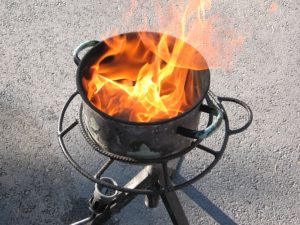Thanksgiving isn’t too far off. This holiday may have positive associations for most Americans, but this is when the highest incidence of kitchen fires occurs. For this reason, we’d like to take this opportunity to review how to behave if a grease fire starts in your kitchen. This is important because the nature of grease fires cuts against some commonly held notions about how to put out fires.

Grease fires pose a unique hazard. Here’s how to overcome them.
Do Not Use Water
Let’s start with the most important point about grease fires: do not attempt to put it out with water. Pouring water on the flames is one of the first instincts many people have in the event of a house fire. But, especially with grease fires, this will actually make things worse.
Have you ever seen a demonstration of the separation of water and oil? If you try to douse a grease fire with water, this same principle is at play. Essentially, the water will create an explosion of steam as it hits the flaming oil, and sends fiery droplets of oil further throughout your kitchen.
Just don’t do it.
Turn Off the Heat
Before you do anything, ask yourself the following: is the fire already spreading? If the fire has spread beyond your stovetop, the first thing you should do is call 911 to report a residential fire.
But if the fire is still contained, see if you can safely turn off the heat. That said, be careful you do not move the flaming pot or pan. The airflow as you do so will likely cause the flames to grow and burn with more intensity.
Use Salt or Baking Soda
This is a tip that too few people are aware of. One of the best ways to put out a grease fire is by using a non-flammable substance such as salt or baking soda (note: do NOT use baking powder). Obviously, this is most practical as long as the fire is still relatively small and manageable.
If this doesn’t work, move on to the next step.
Fire Extinguisher
You should have a class K fire extinguisher near your kitchen. These might be a bit more expensive than the cheapest on the market, but if you ever experience a grease fire, you’ll be glad you had one. It could even save lives, and is certainly worth the investment. If you don’t know how to use a fire extinguisher, check out our guide.
If you do not have a fire extinguisher or if it doesn’t work, the best thing to do would be immediately to evacuate and call 911.
Judd Fire Protection
If you want to ensure your home and business are safe throughout the year, trust Judd Fire Protection, LLC. We have over two decades of experience designing, installing, inspecting, and repairing residential and commercial fire protection systems. We serve clients throughout Maryland, Pennsylvania, Washington, D.C., Virginia, and West Virginia. If you are interested in finding out more about our services and protecting your home and business, give us a call at 410-871-3480 or contact us online. For more fire safety tips, follow us on Facebook, Twitter, and Pinterest.
